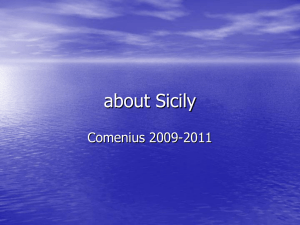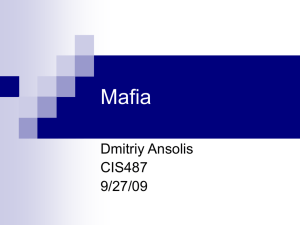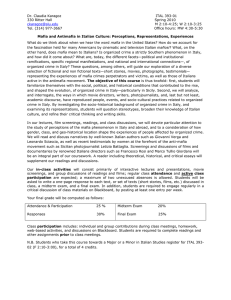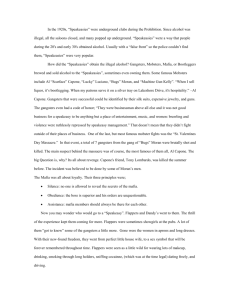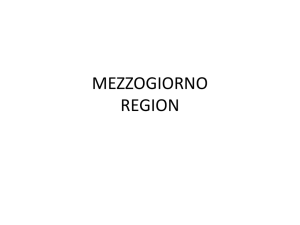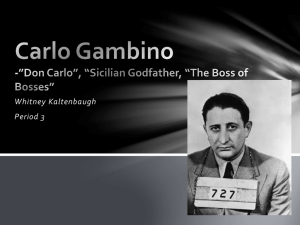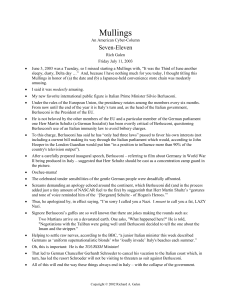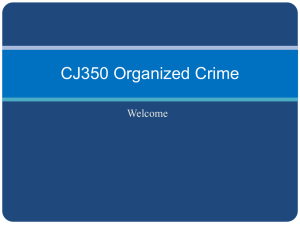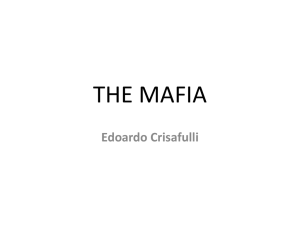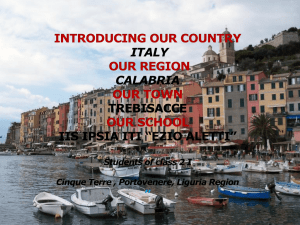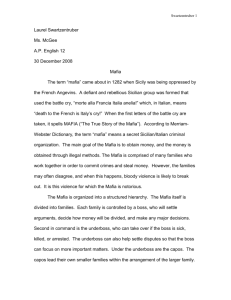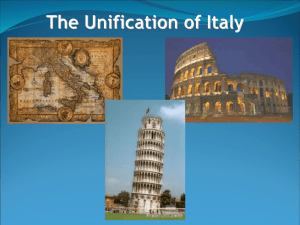MAFIA AND ITALIAN POLITICS
advertisement
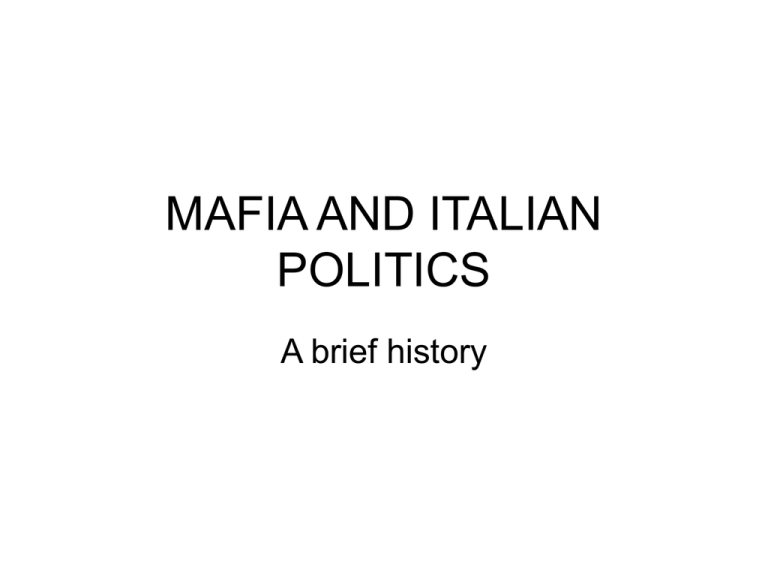
MAFIA AND ITALIAN POLITICS A brief history 19th Century • The Sicilian mafia during the nineteenth century took advantage of the weakness of the newly-built Italian central state and was able to a considerable extent to substitute itself for the state authorities, providing functions of protection, mediation and repression. Mafia and Fascism • In 1925, Benito Mussolini initiated a campaign to destroy the Mafia and assert Fascist control over Sicilian life. • The Mafia threatened and undermined his power in Sicily, and a successful campaign would strengthen him as the new leader, legitimizing and empowering his rule. • Although he did not permanently crush the Mafia as the Fascist press proclaimed, his campaign was nonetheless very successful at suppressing it. • Many mafiosi fled to the United States WW2 • In 1943, nearly half a million Allied troops invaded Sicily. Crime soared in the upheaval and chaos. Many inmates escaped from their prisons, banditry returned and the black market thrived. • During the first six months of Allied occupation, party politics in Sicily were banned. Most institutions, with the exception of the police and carabinieri were destroyed, and the American occupiers had to build a new order from scratch. • As Fascist mayors were deposed, the Allies simply appointed replacements. Many turned out to be mafiosi, They could easily present themselves as political dissidents and their anti-communist position gave them additional credibility. • In the post war period the relationship changed in emphasis. The modernization of southern Italy and Sicily meant that the state became stronger and the mafia lost many of the functions that it had performed in the old rural society. • But just as it found new economic opportunities in drugs and building construction, it found new political opportunities in collusion arrangements with the dominant political parties (first the Christian Democrats and then Berlusconi’s Forza Italia) in Sicily, guaranteeing them votes and unchallenged political influence in return for protection from prosecution by the police and judicial authorities. 1948-1990: Anti-Communism • Italy had a very strong Communist Party. The Italian CP was the strongest in Western Europe and it had built up a good reputation in the struggle against the Mussolini fascist regime which ruled Italy from the 1920s until 1943 and which took Italy into the second world war as an ally with Hitler and Nazi Germany. COLD WAR • Inside Italy the conservatives used the cold war threat ‘if you vote communist Italy will be taken over by the Soviet Union’ etc. The main conservative party was the Christian Democrats (in Italian this is Democrazia Cristiana or DC for short). They ruled the country almost continuously from 1948 until the early 1990s. When one party is in government for such a long period, corruption is almost inevitable. • The mafia saw immediately how to benefit from this new situation by offering itself as an ally to the ruling political elites in the struggle against Communists and Socialists. • Between 1945 and 1955 43 socialists and communists were murdered in Sicily, often at election time. • In other words, at the beginning of the cold war the DC entered into an unspoken contract with the mafia in which the latter would keep the socialists and communists weak in Sicily – by threats and assassinations and by using its influence to pressure people into voting DC at elections – and the DC in turn would use its influence to ensure that the police and judicial system did not put too much pressure on the mafia and interrupt its profitable activities in the drugs trade and the building industry. • This relation of collusion was a major feature of Italian politics from the end of the second world war until the early 1990s. It is not possible to grasp the enormous power and influence of the mafia and the failure of all attempts to curb its power unless this political relationship is understood. A “NEW POLITICAL PADRINO” But it was precisely at this time, the early years of the 1990s that things became to come apart a little. Three fundamental changes were at work 1. The cold war ended. In 1990 the Berlin Wall came down, the Soviet Union fell apart and the need to keep Italy as a ‘front line’ state in the NATO alliance became less important. It thus became less important for the US and Western Europeans to keep the Italian communist party (which had now renamed itself PDS (Partito Democratico della Sinistra – Democratic Party of the Left) out of government at all costs. The enthusiasm for keeping corrupt DC governments in power waned. More and more individuals started to ‘spill the beans’ about corruption in high places. 2. In 1992 Italy was engulfed in a wave of corruption scandals which revealed the extent to which large numbers of powerful Italian multi-national companies had been paying massive backhanders to the political elite for public contracts etc. Their activities dwarfed those of the mafia’s building and construction activities in Sicily and the South of Italy. We were now talking about massive undertakings like the building of the Milan metro system (the tube lines). It was all coming out into the open and that generations of corruption and sleaze was now beginning to come out into the open. All these developments were of course to the disadvantage of the mafia (at least in the short run). Their political friends in Rome were now on the defensive and their power to ‘fix’ things was being drastically reduced. FORZA ITALIA • Christian Democrats party dissolved • Mafia on the lookout for new political alliances • Recently in Italy, two convicted criminals have stated during court hearings that the Forza Italia party was the product of an agreement between Berlusconi and the mafia. Berlusconi’s Fabulous Fortune • Nobody understands just how Silvio Berlusconi amassed such a large fortune, nor is it clear from where, or from whom, the funds for his Milan estate developments and media empire actually came. Sicilians Voted for Forza Italia in 1994, 2001 and again in 2012 • Fuelling suspicions of links between Berlusconi and the mafia is the fact that in the 2001 elections, Berlusconi’s party won more seats via Sicily than via any other Italian region aside from Lombardy up in northern Italy. Now why would impoverished under-developed Sicilians go and vote for a right wing party? Friend or Mafioso? • Marcello Del’Utri, an Italian senator, is a Berlusconi associate and, according to both the mafia stroke criminal turncoats, is the person who brokered the deal with the mafia which led to the setting up of the Forza Italia party.
